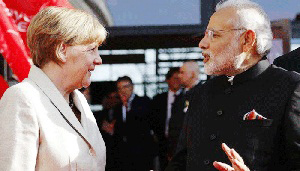Berlin, Apr 14: Prime Minister Narendra Modi today sought German Chancellor Angela Merkel's help in concluding a "balanced and mutually beneficial" Free Trade Agreement with the European Union that has been stalled for two years.
"I have requested Chancellor Merkel that India and European Union should resume the negotiations quickly and conclude a balanced and mutually beneficial agreement at the earliest," Modi said during a joint press conference with German Chancellor after a meeting with her.
"Development of India as a manufacturing hub and expansion of infrastructure of India would also be beneficial for trade. Our imports would also grow. And, it is natural that German companies would benefit a lot from it.
"In this context, I would also like to state that negotiations between India and European Union on a Broad-based Trade and Investment Agreement have remained stalled for two years," he said.
Launched in June 2007, negotiations for the proposed Broad-based Trade and Investment Agreement (BTIA) between India and the 28-member European bloc have witnessed many hurdles as both the sides have major differences on crucial issues.
The two sides are yet to iron out issues related to tariffs and movement of professionals but the EU has shown an inclination to restart talks.
In May, 2013, both sides failed to bridge substantial gaps on crucial issues, including data security status for IT sector.
Besides demanding significant duty cuts in automobiles, the EU wants tax reduction in wines, spirits and dairy products, and a strong intellectual property regime.
On the other hand, India is asking for granting 'data secure nation' status to it by the EU. The country is among nations not considered data secure by the EU.
The matter is crucial as it will have a bearing on Indian IT companies wanting market access.
The EU law mandates that European countries doing outsourcing business with countries that are not certified as data secure have to follow stringent contractual obligations which increases operating costs and affects competitiveness.
India also wants liberalised visa norms for its professionals and market access in services and pharmaceuticals sector.
The two-way commerce stood at USD 101.5 billion in 2013-14. It was USD 57.25 billion during April-October last fiscal.





Comments
Add new comment